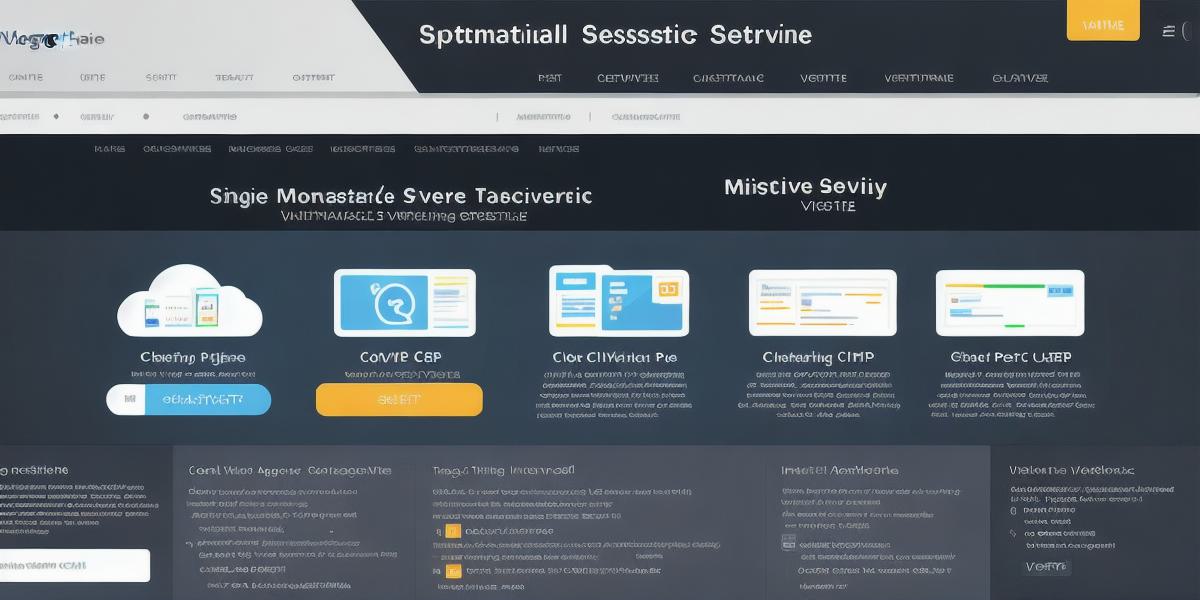What Is Hosting Services? Unraveling the Concept

The Ultimate Guide to Hosting Services: Understanding the Basics and Choosing the Right One for Your Business
Are you tired of your website constantly going down or slowing down? Do you struggle with managing multiple hosting providers and servers? It’s time to learn more about hosting services and choose the right one for your business. In this guide, we will discuss everything you need to know about hosting services, including their benefits, types, and how to choose the best one for your needs.
What are Hosting Services?
Hosting services provide the infrastructure necessary to store, manage, and deliver website files and data to users. They essentially rent out space on servers where you can store your website files, database information, and other critical components that make up your site. There are different types of hosting services available, each with its own set of features and benefits.
Benefits of Hosting Services
- Uptime and Performance: Hosting services ensure that your website is always accessible to users, even during peak traffic periods. They also optimize your site’s performance by providing fast loading speeds and efficient server resources.
- Scalability: As your business grows, you may need to scale up or down your hosting services to accommodate changing traffic demands. Hosting providers offer flexible plans that allow you to easily upgrade or downgrade as needed.
- Security: Hosting providers implement advanced security measures to protect your website from hackers and cyber attacks. They also provide regular backups and disaster recovery options to ensure that your data is always safe.
- Customer Support: When issues arise, hosting providers offer 24/7 customer support to help you resolve them quickly. They may also provide tools and resources to help you manage your site more efficiently.
Types of Hosting Services
- Shared Hosting: This is the most affordable type of hosting, where multiple websites share a single server. While it’s great for small businesses with minimal traffic, shared hosting can be slow and unreliable if one website uses up too many resources.
- Virtual Private Server (VPS) Hosting: VPS hosting provides a virtualized environment where you can run your own operating system and applications. It offers more control and flexibility than shared hosting but still shares the same physical server with other users.
- Dedicated Hosting: With dedicated hosting, you rent out an entire server for your use only. This is the most powerful and customizable type of hosting, providing unlimited resources and complete control over your server environment.
- Cloud Hosting: Cloud hosting uses a network of servers to store and deliver data, allowing you to scale up or down as needed. It offers high availability, security, and performance but can be more complex to set up and manage.
Choosing the Right Hosting Service for Your Business
When choosing a hosting service, consider the following factors:
- Traffic Demands: Determine how much traffic your website receives and choose a hosting plan that can handle those demands.
- Security Needs: Consider your website’s security requirements and choose a provider that offers advanced security measures and regular backups.
- Scalability: Choose a hosting service that allows you to easily upgrade or downgrade as needed to accommodate changing traffic demands.
- Cost: Determine your budget for hosting services and choose one that provides the best value for your needs.
- Customer Support: Look for a provider that offers 24/7 customer support and helpful resources to help you manage your site more efficiently.
Case Study: Choosing the Right Hosting Service for Your Business
John owns an e-commerce website that receives high traffic during peak shopping seasons. He used shared hosting but found that his site was constantly going down or slowing down, leading to lost sales and frustrated customers. After researching different hosting options, John decided to switch to a dedicated hosting plan with a reputable provider. He now enjoys fast loading speeds, unlimited resources, and complete control over his server environment, leading to increased sales and customer satisfaction.
Conclusion
Choosing the right hosting service for your business is crucial








